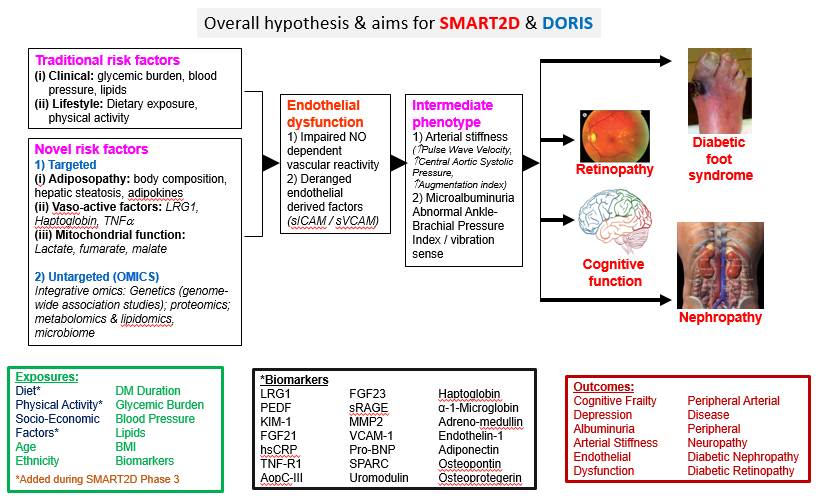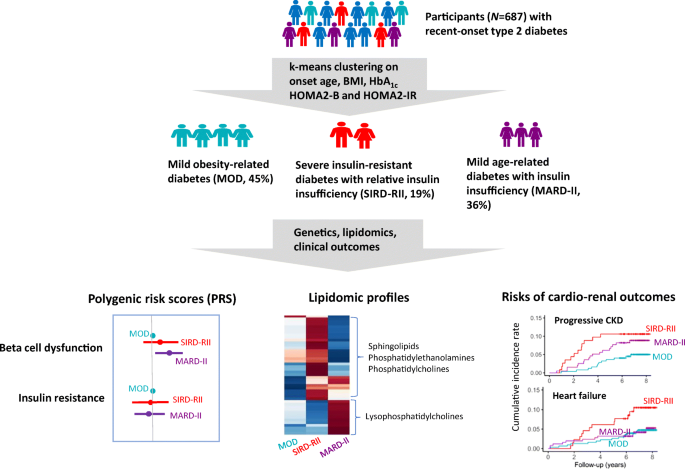Singapore Study of Macro-angiopathy and Microvascular Reactivity in Type 2 Diabetes (SMART2D Cohort Study)

Introduction
The SMART2D cohort was started in 2011, to study the impact of diabetes related metabolic risk factors (RFs) on blood vessel function & common diabetic complications (e.g. diabetic kidney disease, diabetic foot syndrome & cognitive function).

The aims of the study, along with the exposures, biomarkers and outcomes explored in the study.
(DORIS: Diabetic nephropathy –
Onset & Risk factors study, is a sister-cohort of SMART2D
https://www.ktph.com.sg/health-professionals/clinical-research/research-highlights#doris)
The SMART2D cohort
- Is a key member of a nationwide, multi-institution consortium to study diabetic kidney disease & retinopathy.
- Receives a total of nearly S$5 million (FY2012 to FY2021) in funding by the National Medical Research Council (NMRC).
- Aims to recall all of our past participants to study the RFs (with emphasis on lifestyle factors) & disease progression. In the next phase (year 2024 onwards), we will organize the serial collection of bio-specimens, along with follow-up data on RFs & diabetic complications.
- Has generated over 70 papers in high-impact, international peer-reviewed scientific journals and shared our findings at numerous national and international conferences.
The SMART2D Cohort Study was first launched in 2011 by Drs Lim Su Chi, Tavintharan Subramaniam, Yeoh Lee Ying and Sum Chee Fang, funded by the highly competitive National Medical Research Council's (NMRC) Program Project Grant (PPG). Since then, Dr Lim Su Chi has been awarded two additional NMRC Clinical Scientist Individual Research Grants (CS-IRG) to recall all the participants for re-evaluation to study changes in RF and disease-progression.
Timeline of SMART2D Study
By exploiting the synergy between clinical and molecular epidemiology, SMART2D will continue as a longitudinal study that investigates the relationship between risk factors (genetic and non-genetic), vascular function (i.e. intermediate phenotype - endothelial reactivity and arterial stiffness) and final phenotypes (diabetic foot syndrome, nephropathy, retinopathy & cognitive dysfunction).
The SMART2D study collaborates with prestigious institutions such as the Genome Institute of Singapore (GIS), National University of Singapore (NUS), National Healthcare Group Polyclinics (NHGP) and the Wellcome Trust Centre for Human Genetics at Oxford, UK. In addition, the cohort is part of a nation-wide, multi-institution consortium (DYNAMO: Diabetes studY in Nephropathy And other Microvascular cOmplications) devoted to studying diabetic kidney disease and retinopathy.
Recent highlights
We use clinical variables to perform cluster analysis in the SMART2D cohort, allowing us to identify novel subgroups with distinct genetic signatures, lipidomic patterns, and cardio-renal risks in Asian patients with recent-onset type 2 diabetes which may serve as a starting point to stratify the diverse diabetic population into subgroups for precision medicine in our Asian population for better health outcomes. Our work has been covered in the media by the Singapore national newspapers, Berita Harian ("Kajian KTPH buka jalan bagi rawatan penyakit kencing manis lebih tepat", 15 November 2022) and 联合早报 ("糖尿病患者分类型 护理治疗更精准", 28 February 2023).

Diabetologia. 2022 Dec; 65(12):2176. doi:
https://doi.org/10.1007/s00125-022-05741-2.
To enhance the sample-size, we are recruiting new volunteers for our prospective study. Various health assessment tests, including blood and urine tests, foot screening, body composition analysis and questionnaires to investigate diet, physical activity and cognition may be conducted. The results obtained from these tests can be used to inform the volunteers (and their doctors) of any changes in their health status and blood vessel function. If you are interested in learning more about the study or would like to join us as a study volunteer, please contact our lead study coordinator Ms Qi Xiaoge at 8798 3468 or our project manager Dr Keven Ang at 6602 2343. Alternatively, you may also email the study team at
[email protected]. Collection, use and disclosure of your personal data shall be in accordance with our institution's privacy policy.
Highlighted Publications
- Liu, J. J., Liu, S., Wang, J., Pek, S. L. T., Lee, J., Gurung, R. L., Ang, K., Shao, Y. M., Tavintharan, S., Tang, W. E., Sum, C. F., & Lim, S. C. (2023). Urine Leucine-Rich α-2 Glycoprotein 1 (LRG1) Predicts the Risk of Progression to End-Stage Kidney Disease in Patients With Type 2 Diabetes. Diabetes care, 46(2), 408–415.
https://doi.org/10.2337/dc22-1611
- Wang, J., Liu, J. J., Gurung, R. L., Liu, S., Lee, J., M, Y., Ang, K., Shao, Y. M., Tang, J. I., Benke, P. I., Torta, F., Wenk, M. R., Tavintharan, S., Tang, W. E., Sum, C. F., & Lim, S. C. (2022). Clinical variable-based cluster analysis identifies novel subgroups with a distinct genetic signature, lipidomic pattern and cardio-renal risks in Asian patients with recent-onset type 2 diabetes. Diabetologia, 65(12), 2146–2156.
https://doi.org/10.1007/s00125-022-05741-2
- Liu, J. J., Pek, S. L. T., Wang, J., Liu, S., Ang, K., Shao, Y. M., Tang, J. I., Gurung, R. L., Tavintharan, S., Tang, W. E., Sum, C. F., & Lim, S. C. (2021). Association of Plasma Leucine-Rich α-2 Glycoprotein 1, a Modulator of Transforming Growth Factor-β Signaling Pathway, With Incident Heart Failure in Individuals With Type 2 Diabetes. Diabetes care, 44(2), 571–577.
https://doi.org/10.2337/dc20-2065
- Liu, J. J., Pek, S. L. T., Liu, S., Wang, J., Lee, J., Ang, K., Shao, Y. M., Gurung, R. L., Tavintharan, S., Tang, W. E., Sum, C. F., & Lim, S. C. (2021). Association of Plasma Leucine-Rich Alpha-2 Glycoprotein 1 (LRG1) with All-Cause and Cause-Specific Mortality in Individuals with Type 2 Diabetes. Clinical chemistry, 67(12), 1640–1649.
https://doi.org/10.1093/clinchem/hvab172
- Low, S., Goh, K. S., Ng, T. P., Ang, S. F., Moh, A., Wang, J., Ang, K., Subramaniam, T., Sum, C. F., & Lim, S. C. (2020). The prevalence of sarcopenic obesity and its association with cognitive performance in type 2 diabetes in Singapore. Clinical nutrition, 39(7), 2274–2281.
https://doi.org/10.1016/j.clnu.2019.10.019
- Liu, C., Teo, M. H. Y., Pek, S. L. T., Wu, X., Leong, M. L., Tay, H. M., Hou, H. W., Ruedl, C., Moss, S. E., Greenwood, J., Tavintharan, S., Hong, W., & Wang, X. (2020). A Multifunctional Role of Leucine-Rich α-2-Glycoprotein 1 in Cutaneous Wound Healing Under Normal and Diabetic Conditions. Diabetes, 69(11), 2467–2480.
https://doi.org/10.2337/db20-0585
- Liu, J. J., Liu, S., Gurung, R. L., Ang, K., Ee Tang, W., Sum, C. F., Tavintharan, S., Hadjadj, S., & Lim, S. C. (2019). Arterial Stiffness Modulates the Association of Resting Heart Rate With Rapid Renal Function Decline in Individuals With Type 2 Diabetes Mellitus. Arteriosclerosis, thrombosis, and vascular biology, 39(11), 2437–2444.
https://doi.org/10.1161/ATVBAHA.119.313163
- Gurung, R. L., Yiamunaa, M., Liu, S., Liu, J. J., Chan, C., Choo, R. W. M., Ang, K., Sum, C. F., Tavintharan, S., & Lim, S. C. (2019). Association of haptoglobin phenotype with incident acute myocardial infarction in Chinese patients with type 2 diabetes. Cardiovascular diabetology, 18(1), 65.
https://doi.org/10.1186/s12933-019-0867-4
- Dorajoo, R., Chang, X., Gurung, R. L., Li, Z., Wang, L., Wang, R., Beckman, K. B., Adams-Haduch, J., M, Y., Liu, S., Meah, W. Y., Sim, K. S., Lim, S. C., Friedlander, Y., Liu, J., van Dam, R. M., Yuan, J. M., Koh, W. P., Khor, C. C., & Heng, C. K. (2019). Loci for human leukocyte telomere length in the Singaporean Chinese population and trans-ethnic genetic studies. Nature communications 10 (1), 2491.
https://doi.org/10.1038/s41467-019-10443-2
For other SMART2D Publications,
click here.
